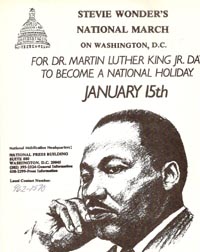 Today marks the 25th anniversary of the federal holiday honoring the birthday of Rev. Dr. Martin Luther King, Jr. Looking back - it is hard to believe that there was opposition to creating a holiday recognizing the work and life of one of our nation’s greatest citizens, and a human rights leader who had worldwide impact. There are now streets, schools, recreation centers and statues bearing the name of Dr. King in countries across the continents. It is a wonderful testament to the role that Dr. King played in challenging the United States to be the nation it professes to be in its Constitution, and the world to recognize that violence is not the answer to solving problems.
Today marks the 25th anniversary of the federal holiday honoring the birthday of Rev. Dr. Martin Luther King, Jr. Looking back - it is hard to believe that there was opposition to creating a holiday recognizing the work and life of one of our nation’s greatest citizens, and a human rights leader who had worldwide impact. There are now streets, schools, recreation centers and statues bearing the name of Dr. King in countries across the continents. It is a wonderful testament to the role that Dr. King played in challenging the United States to be the nation it professes to be in its Constitution, and the world to recognize that violence is not the answer to solving problems.
We must also pay tribute to the three people who were principally responsible for the national holiday – Rep. John Conyers, entertainer Stevie Wonder and the late Coretta Scott King, wife of the late civil rights leader. Almost immediately after Dr. King was assassinated, Conyers, who represents Detroit in the House of Representatives, introduced a bill to create a national holiday to celebrate the birthday of Dr. King. It was a bold and appropriate move, and a gesture that required Conyers’ vigilance and perseverance for two decades as he continually reintroduced the legislation. The internationally acclaimed Stevie Wonder became intimately involved in the drive for a King holiday in the 1980’s when he led a march in the nation’s capital and penned a song – Happy Birthday – as a theme for the effort. Mrs. Coretta Scott King, a true partner in her late husband’s work and a civil rights leader in her own right, continued the work they had committed their lives to through the development of the King Center in his native Atlanta. She was a constant voice that reminded the nation that Dr. King was truly worthy of an honor that had been normally reserved for Presidents.
Now that we have the King holiday it is up to each of us to draw meaning from Dr. King’s work and to use the day to reflect upon how we can continue down the path to true equality. There are some visible signs of progress in our country, perhaps the most noteworthy being the election of an African American as President of the United States. However, there are still too many areas in which Blacks are lagging and where problems affect us disproportionately. We have no doubt that Dr. King would be disturbed over the state of public education in our country, he said as much in his final book, “Where Do We Go From Here: Chaos or Confusion.” He would find equally upsetting the wide income disparities and the manner in which Blacks are affected disproportionately by chronic illnesses. While he would likely be encouraged by the election of Barack Obama, he would be the first to point out the need to revitalize our communities. The violence we witness in our cities, and the wars we engage overseas, would certainly trouble Dr. King and he would be the most vocal opponent to the U.S. military presence in Iraq and Afghanistan.
While all of the above is true, we believe what would concern Dr. King most is the malaise that has set upon the Black community. He was a man of action, and the inertia we see today would undoubtedly be a sore point. In many ways, the post-civil rights era has been marked by a lack of clarity and vision in regard to the direction Blacks should take to build upon the successes of the 1960’s. King was clear that income inequality – poverty – and economics was the next frontier. It is why he went to Memphis to aid sanitation workers fighting for a living wage and union representation, and why the “Poor People’s Campaign” was to be his next large scale effort to address inequities. We need to return to the prescription Dr. King wrote in his final book because it truly does, in a prophetic way, provide a roadmap for action in the 21st century.
Finally, we need real leaders to emerge and we need to separate celebrity from leadership. We have become so invested in idolatry that we invest our confidence in individuals simply because we see them on television or they can deliver a good speech. We do a disservice to Dr. King’s memory if we equate his greatness simply to his oratory. He was a true intellectual, a man of faith and a visionary organizer who was smart enough to have truly brilliant people as part of his inner circle, and not concerned that their brilliance might outshine his. We are not waiting for another Dr. King. There will never be another like him, just as there will never be another Nelson Mandela. What we hope, what we pray we will see, is a new generation of principled and committed Black leadership in many facets of society, not just clergy and certainly not only in elected office. The greatest tribute we can pay to Dr. King is if we lead the fight for social justice and human rights in our daily lives, from the smallest acts of kindness to taking on the larger institutional structures that continue to drive inequities.












